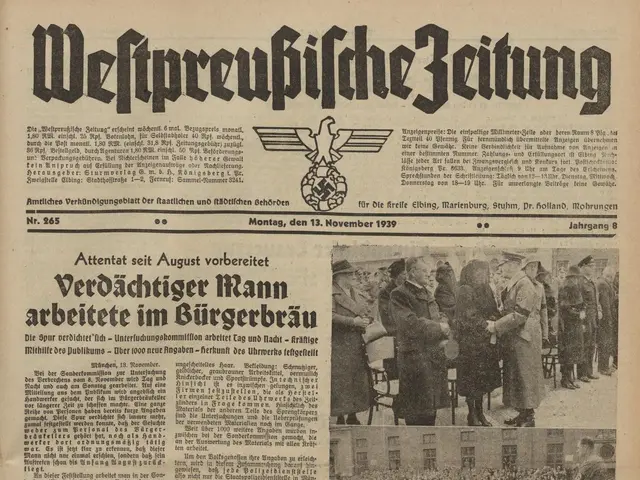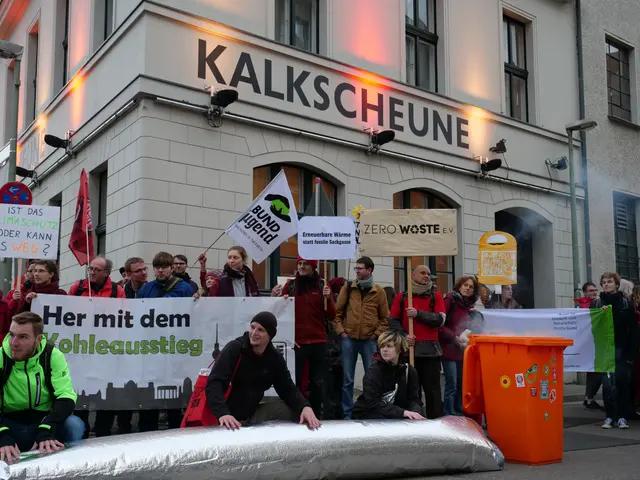Fighter jet and weapon manufacturing employees at Boeing stage a labor protest, numbering in thousands
In a significant development, approximately 3,200 workers at Boeing's St. Louis-based defense unit went on strike on Monday, marking the first strike at this facility since 1996 [1][2]. The work stoppage has disrupted production of key defense products, including the F/A-18 Super Hornet, F-15EX, the MQ-25 tanker drone, T-7 trainer, and the upcoming F-47 sixth-generation fighter.
The strike, which has led to factory shutdowns affecting critical components for U.S. military aircraft and weapons systems, threatens to derail recent financial improvements in Boeing's Defense, Space & Security business [1]. Before the strike, the division had posted two consecutive quarters of improved financial performance [1].
The workers, members of the International Association of Machinists and Aerospace Workers, rejected a modified four-year labor agreement proposed by Boeing. The rejection was primarily due to concerns over wages, pension benefits, and work schedules [1][2]. The contract proposed a 20% wage increase over four years but would take new employees 12 years to reach top pay, which many machinists found inadequate, especially given inflationary pressures [2]. Additionally, the company’s proposed Alternative Work Schedule was opposed by workers [1][2].
Boeing CEO Kelly Ortberg stated that the impact from the strike would be much less than a walkout last year by 33,000 workers who assemble the company’s commercial jetliners [1]. Boeing is prepared for the strike and has implemented a contingency plan to ensure non-striking workforce can continue supporting customers [1].
The strike comes at a challenging time for Boeing, following several federal investigations after a door plug blew off a 737 Max plane during an Alaska Airlines flight in January [2]. The 737 Max door-plug incident raised concerns about the safety of the 737 Max, which crashed twice in 2018 and 2019, resulting in the deaths of 346 people [2].
The Federal Aviation Administration has put limits on Boeing airplane production due to concerns about manufacturing quality safeguards at the company, renewing concerns about the safety of the 737 Max [2]. Boeing has worked its way up to an FAA-set 737 Max production cap of 38 per month and expects to ask regulators later this year for permission to go beyond it [2].
The strike could potentially complicate Boeing's efforts to regain its financial footing. Shares of Boeing Co. slipped less than one per cent before the opening bell on Monday [2]. Boeing's second-quarter revenue improved, and its losses narrowed compared to the same period last year, with the company reporting a loss of $611 million in the second quarter [2].
Sources: [1] Reuters. (2025, August 4). Boeing machinists strike at St. Louis defense unit over pay, benefits, work rules. Retrieved from https://www.reuters.com/business/aerospace-defense/boeing-machinists-strike-at-st-louis-defense-unit-over-pay-benefits-work-rules-2025-08-04/
[2] Associated Press. (2025, August 4). Boeing machinists strike over pay, benefits, work rules at St. Louis defense unit. Retrieved from https://apnews.com/article/business-aerospace-defense-boeing-labor-unions-industries-missouri-7a2f6c83c365f86c3a349f6f6c3c4495
- The strike at Boeing's defense unit, primarily due to concerns over wages, pension benefits, and work schedules, could potentially impact the finance and financial improvements in Boeing's Defense, Space & Security business.
- The disagreement over the modified labor agreement, which included a 20% wage increase but took new employees 12 years to reach top pay, has the potential to disrupt the aerospace and business operations of Boeing, especially considering the ongoing concerns about the safety of their aircraft and the need for improved productivity.








